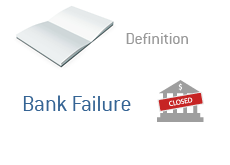Definition of Bank Failure
What is a "bank failure"? What is the definition of the term "bank failure"?
You have likely heard that there have been a high number (expected to be north of 150) bank failures in the United States in 2010.
What does the term "bank failure" mean? If you have an account at a failed bank, does this mean that you lose all of your money?
 Let's answer the second question first. The FDIC (Federal Deposit Insurance Corporation) is a government corporation that provides deposit insurance. In the history of the FDIC (established in 1934), no depositor has EVER lost any insured funds as a result of a failure in the United States. The FDIC provides deposit insurance up to $250,000 per depositor per bank. If a bank fails, then the FDIC will usually have another bank already lined up to take over the accounts of customers at the failed bank by the time that the announcement is made. In rare cases (such as during the height of the financial meltdown in 2008), the FDIC will actually step in and take over the failed bank themselves.
Let's answer the second question first. The FDIC (Federal Deposit Insurance Corporation) is a government corporation that provides deposit insurance. In the history of the FDIC (established in 1934), no depositor has EVER lost any insured funds as a result of a failure in the United States. The FDIC provides deposit insurance up to $250,000 per depositor per bank. If a bank fails, then the FDIC will usually have another bank already lined up to take over the accounts of customers at the failed bank by the time that the announcement is made. In rare cases (such as during the height of the financial meltdown in 2008), the FDIC will actually step in and take over the failed bank themselves. Now - what exactly is a bank failure?
Bank failures occur when a bank is no longer able to meet is obligations. This is similar to when a person declares bankruptcy - they no longer have the assets to cover their debts.
What can cause a bank to fail? A number of things, including:
-increase in delinquent loans
-questionable risk management policies
-spike in withdrawals
Bank failures, as you can probably guess, spike during times of economic turmoil. More loans go sour, people have less money to deposit, etc.
Having said that, even during times of great stress in the economy (such as the fall of 2008), the number of bank failures compared to the overall number of FDIC-insured banks is fairly small (2-3% at the most).
--
Davemanuel.com Articles That Mention Bank Failure:
President Obama's First Term By The Numbers
103 Bank Failures This Year and Counting
Problem Bank List Continues to Increase in Size
"Problem Bank List" Tops 700
15 Banks Have Already Failed in 2010
